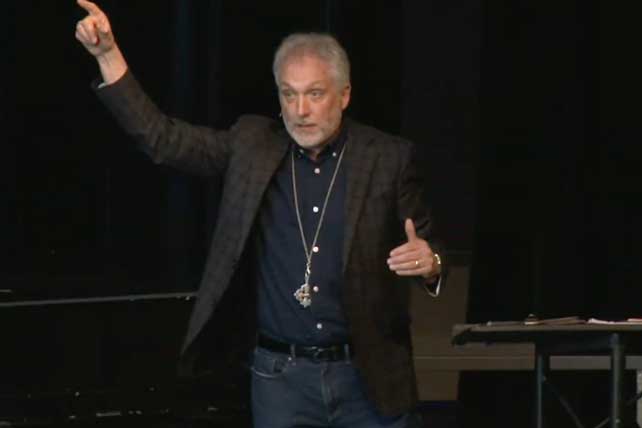(RNS) — The long-awaited church trial of Bishop Stewart Ruch, a leader in the Anglican Church in North America, is facing a crisis in the wake of the sudden resignation of a lawyer who represented the denomination in the proceedings. In a resignation letter dated July 19 (Saturday), the lawyer, C. Alan Runyan, wrote that “the trial process had been irreparably tainted.”
“I am sorry for the burden it places on you and on all those who seek a just resolution of these charges,” said Runyan in his letter to Archbishop Steve Wood, who heads the denomination. “Nevertheless, this is not simply something that can be casually overlooked for expediency’s sake.”
Wood notified ACNA members of the “significant and regrettable development” in an email Sunday evening. He also announced that he would begin the process of appointing a new prosecutor.
RELATED: In Scandal’s Wake, ACNA Adopts New Rules on Reporting Misconduct
In a second announcement Monday morning, Wood said the resignation was in response to a line of questioning that Runyan said drew on material not within the scope of the trial. The announcement, which linked to Runyan’s resignation letter, included a ruling, issued by the seven-member Court for Trial of a Bishop, that the trial will resume on Aug. 11.
Ruch, whose actions are the focus of the proceedings, is bishop of the ACNA’s Upper Midwest Diocese, which comprises 18 churches from several states, including Illinois and Wisconsin. Ruch has been accused of mishandling multiple abuse allegations in the diocese, failing to prioritize victims in the wake of abuse allegations and knowingly welcoming individuals with histories of predatory behavior into diocesan churches without alerting church members.
Abuse survivors first went public with their concerns of Ruch’s handling of abuse allegations in 2021, and since then more than 10 clergy and other lay leaders in the Upper Midwest Diocese have been accused of misconduct.
The Court for Trial of a Bishop, which includes bishops, priests and lay members, must determine whether Ruch is guilty of four charges: that he habitually neglected the duties of the bishop’s office; that he engaged in conduct “giving just cause for scandal or offense,” including abuse of church power; that he violated his ordination vows; and that he disobeyed or willingly violated church bylaws.
But after five days of proceedings, that process has been jeopardized, Runyan claims. In his resignation letter, Runyan — who represented the Anglican Diocese of South Carolina in its 10-year legal battle with the Episcopal Church over the ownership of church properties — says that on the fifth day of the trial, a member of the court began questioning the denomination’s expert witness based on materials that were not “in evidence before the Court” and “not properly in the trial record.”
That line of questioning, the letter argues, was problematic because it pertained to and “cast suspicion on” the investigative process that preceded the charges before the court.
Runyan writes that in April, the court ruled that “evidence of the investigative process was ‘improper.’” This decision was apparently made because, leading up to the trial, Ruch had focused on “information about the investigative process,” rather than focusing exclusively on evidence pertaining to the charges against him, Runyan said.
“At that point, all six of the other members of the Court had been exposed to an unwarranted suspicion of provincial investigative bias brought into the trial by a single Court member, contrary to the Court’s duty to determine the outcome based solely on the evidence in the trial record,” Runyan said. His resignation includes a request that the entire trial record and full transcript — all properly redacted — be made available to all ACNA members. The four lay authors of a presentment, or list of charges, that precipitated the trial have also called for the release of the redacted transcript, as has the anti-abuse advocacy group ACNAtoo, which noted today that “the people who suffer the most in this imbroglio are the survivors.”

